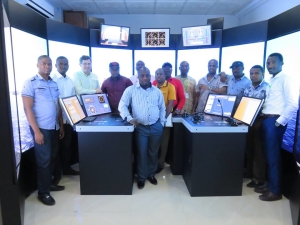Maritime Resource Management
Held in: Lagos, Nigeria
Aim
Efficient Maritime Resource Management is chiefly dependent upon the effectiveness of the communications and information exchanges between vessel personnel and upon the mutual understanding each has for the functions and duties of the others. Ship’s personnel, shore based ship management and the relevant port and pilotage authorities should utilize the proven concept of “Vessel Team Management”. Establishment of effective co-ordination between the pilot, master and other ship’s personnel, taking due account of the ship’s systems and the equipment available is a prerequisite for the safe voyage of the ship. The course gives an understanding to the participants of theoretical aspects and hands on exercises.
Objectives
The trainees who successfully complete this course will make a more effective contribution to the Vessels team during ship voyage/maneuvering in normal and emergency situations. In particular, trainees will gain:- a greater awareness of the importance of planning a passage or maneuver and the need for an alternative plan; – a greater awareness and understanding of a good interactive communication style and benefit of building up a common shared mental model of the planned passage.
This training course meets the requirement laid down in the IMO International convention on standards of Training, certification and watch-keeping for Seafarer 1978 as amended by the Manila amendment in the following areas;
• Reg A-II/1 For Bridge Resource Management
• Reg A-III/1 for Engine Room Resource Management
• Reg A-II/2 and A-III/2 for use of leadership and Management
• Reg A-II/ 1 and A-III/6 for application of leadership and team-working skill.
Entry standards
Entry standards Trainees willing to enter this course should have a minimum of six months’ watch keeping experience as officer in charge of a navigational or engine room watch.
Course content
- Introduction to Maritime Resource Management (theoretical + practical).
- Familiarization with the Maritime (practical).
- Situation awareness (theoretical + practical).
- Attitudes and management skills (theoretical + practical).
- Standard manoeuvres (practical).
- Cultural awareness (theoretical + practical).
- Communication and briefings (theoretical + practical).
- Briefing and debriefing for pilotage (theoretical + practical).
- Challenge and response (theoretical + practical).
- Short term strategy (theoretical + practical).
- Authority and assertiveness (theoretical + practical).
- Shallow water effects, bunk, channel and interaction effect (theoretical + practical).
- Workload (theoretical + practical).
- State of the ship (theoretical + practical).
- Human involvement in error (theoretical + practical)
- Judgement and decision making (theoretical + practical).
- Leadership in emergencies (theoretical + practical).
- Crisis management (theoretical + practical).
- Automation awareness (theoretical + practical).
- Several practical exercises including final assessment exercise (practical).

Course Management Details
The course will be conducted at the PEM Offshore Simulation and Innovation Centre (POSAIC). The environment will be classroom. The optimum number of students is six, maximum eight and minimum four. The desired instructor to student ratio is 1:8. A typical schedule is contained in Annex A. Assessment. Students are assessed based on their ability to complete practical assignments related to each PO. If they fail the test, a retest can be done on the same day (4.00 pm).
Course Duration
Five (5) days.
